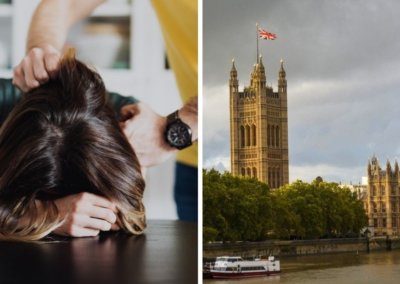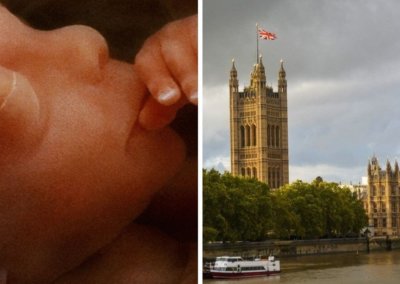An attempt to hijack the UK Government’s flagship Domestic Abuse Bill with two extreme abortion proposals has failed.
The Speaker of the House, Sir Lindsay Hoyle, announced yesterday afternoon that amendment New Clause 29, which would have introduced abortion for any reason up to 28 weeks, would not be selected for debate.
Diana Johnson MP later withdrew amendment New Clause 28, which would have allowed both medical and surgical abortions to take place in any location if a woman is in an abusive relationship, following a good number of strong speeches against it.
Stirring speeches from Fiona Bruce MP and Carla Lockhart MP, along with a number of other MPs who don’t share their pro-life position on abortion, made it clear that this amendment would have had serious negative consequences for victims of domestic abuse.
As a result, it appears that the abortion lobby realised the extreme likelihood of their radical amendment being defeated and encouraged Diana Johnson to withdraw it.
If the Labour MP had pushed the amendment to a vote and lost, this would have been the first time a pro-abortion amendment or Bill had been defeated in a vote in UK history.
Pro-life MP Fiona Bruce MP put forward an amendment calling for a review of the current temporary measures allowing ‘DIY’ abortions. The amendment called for the Government to conduct an “an inquiry into the safety, number, and impact of abortions carried out under the temporary coronavirus crisis provisions where the place of abortion was the woman’s home”.
The Government subsequently agreed to a full inquiry into the temporary ‘DIY’ abortion measures.
Stirring speeches against extreme abortion amendment
Contrary to the abortion lobby’s claims and the aims of the Domestic Abuse Bill, New Clause 28 would have likely resulted in a far greater number of women being coerced or forced into an unwanted abortion.
By making both medical and surgical abortions legal outside of a hospital setting or place approved by the Secretary of State and removing the requirement for an in-person consultation, it would be difficult for physicians and providers to ascertain if abuse or coercion is involved.
The extreme change could have compromised the privacy of the patient and, in theory, would have allowed an abuser to hide in the background of an ‘electronic’ consultation.
Additionally, New Clause 28 would have removed the current 9 weeks and 6 days’ gestation time limit on ‘DIY’ home abortions which is present under the current temporary regulations.
This concern was raised in the House of Commons last night by Conservative MP Fiona.
Speaking against the amendment, the pro-life MP said she could not put forward key objections any better than a response from a female GP who she quotes as saying:
“I am very concerned about the proposed changes to new clause 28. It is extraordinary that it should be argued that a woman suffering or at risk of domestic abuse, seeking abortion should somehow be considered to be at less risk if she consults a doctor remotely by telemedicine and given abortifacients to take at home.
“Where is the opportunity to check with her, privately, that she is not being coerced or that she may be in danger, to examine her to determine her stage of pregnancy, to offer support and clear advice in a place of safety? As a medical practitioner working remotely, how can I reliably ensure she is at the stage of pregnancy she says she is, as the use of abortifacients used later than the 9 weeks 6 days limit carries greater risk of complications which I would be responsible for providing care for? And how can I provide assurance that this woman is suffering from domestic abuse unless it has been previously disclosed to me… These factors are virtually impossible to verify without a face to face consultation.”
Speaking from a personal capacity, Fiona Bruce then went on to say: “This is a domestic abuse Bill; it should not be hijacked by those continuously campaigning on another issue and constantly looking for opportunities in this place to add badly worded amendments to Bills with unforeseen implications and complications.”
Alex Stafford MP echoed Fiona Bruce’s concerns and said such a “seismic change” in the UK’s abortion law shouldn’t be “tacked on” to the Domestic Abuse Bill.
Outlining his concerns with the amendment the MP for Rother Valley said: “Disturbingly, the new clause does not have a gestation period limit and is not limited to medical abortion.
“In terms of addressing domestic abuse, as we have heard, the new clause could in fact worsen the very problem that it tries to address.
“By removing confidential face-to-face meetings between women and a medical professional, it becomes impossible for clinicians to establish whether the woman was coerced into requesting the home pill or even whether it was in fact her on the telephone. This is a serious point. We should not do anything that could make domestic abuse any worse.”
Carla Lockhart MP shared the concerns of a person who works with women experiencing domestic abuse in England who said: “We work every day with women who experience domestic abuse. We see the way they are controlled and manipulated. To me, this suggests the legislation will only be making that worse. It will give abusers more power and more reason to keep the woman being abused at home, away from people who can really help them.”
The pro-life MP said MPs “should not hinder” professionals like these in their work and that “laws should be designed to help vulnerable women escape domestic abuse situations, not enable them to remain in those horrific situations”.
She added: “The new clause seems to be a clear attempt to use the Domestic Abuse Bill as a vehicle to advance an agenda that is emphatic on expanding access to abortion, seemingly failing to acknowledge that allowing women to have an abortion at locations other than hospitals or places approved by the Secretary of State has already led to serious complications. We all know that abortion is not the answer to domestic abuse. Surely we should be addressing how women find themselves in such difficult situations, and take measures to prevent that?”.
Barrister and Chair of the Justice Select Committee Sir Robert Neill raised concerns from his experience as a criminal practitioner saying: “on more than one occasion, I found instances where part of the abuse had been to force the victim to have an abortion.”
Highlighting that the new amendment would further compound this problem, he added: “The irony is that reliance on a telephone call to procure the means of doing that does not give the safeguard of knowing who is standing next to the victim when she makes the telephone call. I have certainly seen instances of that in practice, as other criminal practitioners will have done. Although the intentions are good and well meant, I have a concern about moving down the route set out in new clause 28.”
Abortion up to 28 weeks avoided
Amendment New Clause 29, which was not selected for debate and will, therefore, not be included in Domestic Abuse Bill legislation, would have made extreme changes to abortion legislation by repealing sections 58 and 59 of the Offences Against the Person Act. This would have left England and Wales with no abortion law through to 28 weeks.
Almost all current legal safeguards on abortion would have been removed, up until when a child is capable of being born alive, with a ceiling of 28 weeks.
This would have introduced abortion on demand, for any reason – including sex-selective abortion – up to 28 weeks. The change would have been the most extreme change to abortion legislation since 1967 and would have left England and Wales with one of the most extreme abortion laws in the world.
Women against extreme abortion proposals
The failed proposals were radically out of step with the opinions of women on abortion.
Polling from Savanta ComRes on whether time limits for abortion should be increased shows that only 1% of women want the time limit to be extended; in contrast, 70% of women are in favour of a reduction in time limits.
The polling also showed that 77% of women agree that doctors should be required to verify in person that a patient seeking an abortion is not under pressure from a third party to undergo the abortion, and 91% of women agree that gender-selective abortion should be explicitly banned by the law.
Major victory
A spokesperson for Right to Life UK, Catherine Robinson said:
“This is a major victory for the unborn child and women facing unplanned pregnancies. These amendments would have left the unborn child with considerably worse protections and removed many of the current safeguards which protect women facing unplanned pregnancies.
“Thank you to the thousands of people that rallied over the last week to get friends and family to email their MPs. MPs received more emails ahead of this vote than they have ever received ahead of an abortion vote.
“Thank you to the amazing group of pro-life MPs in Parliament who have worked so hard to ensure that these extreme amendments were defeated.
“Thank you to the large number of organisations that have all come together to encourage their supporters to contact MPs and ensure this major attempt to introduce extreme abortion changes was defeated.”












